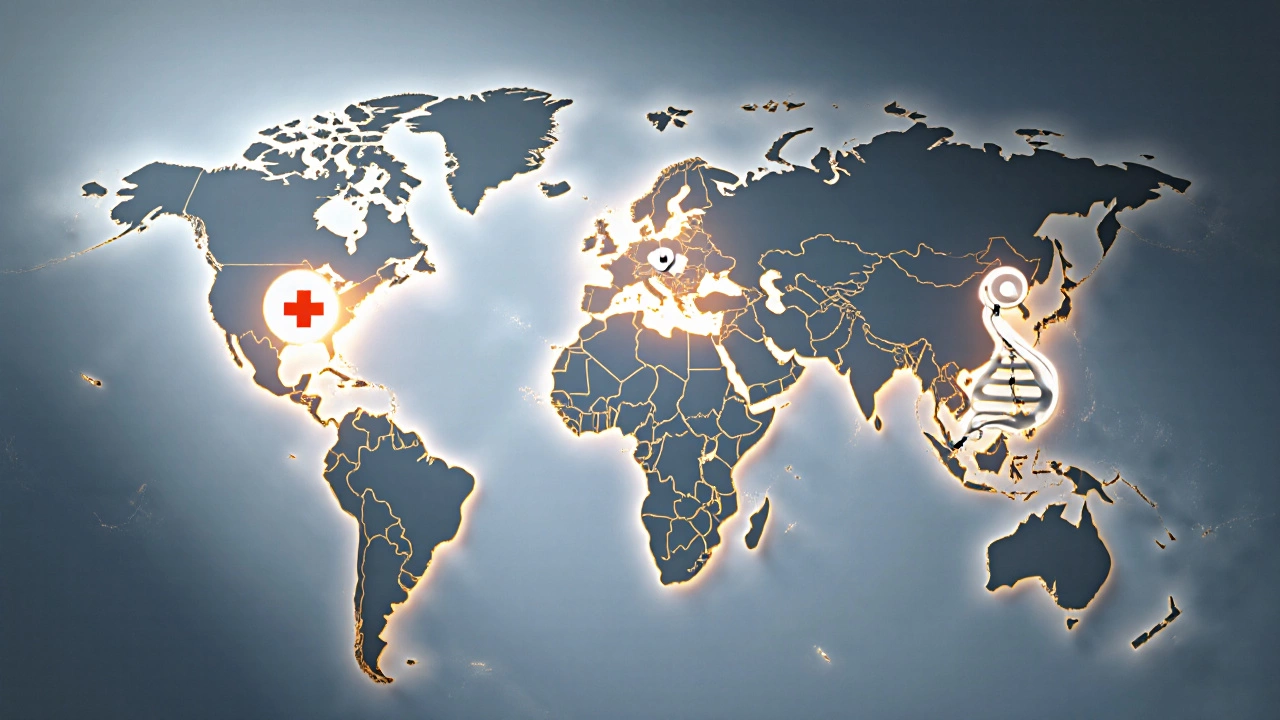 Oct, 12 2025
Oct, 12 2025
Healthcare System Selector
Select your priorities to find the healthcare system that best matches your needs. Based on the 2025 rankings from the World Health Organization framework.
Your Best Match

Switzerland
Universal private insurance system with high quality and rapid specialist access
Why it matches you: Your priorities for align with this country's strongest aspects.
Key metrics
Life expectancy
84.2 years
Out-of-pocket costs
12% of total spending
Infant mortality
3.2 per 1,000
Patient satisfaction
86%
Key Takeaways
- Switzerland, Japan, and Singapore lead the 2025 global rankings based on quality, access, and cost efficiency.
- Four main criteria drive the rankings: health outcomes, equity, financial protection, and patient experience.
- High‑income countries dominate, but a few middle‑income nations punch above their weight thanks to focused public‑health policies.
- A simple comparison table lets you see how each top country stacks up on the core metrics.
- Choosing a system that fits your needs depends on whether you value low out‑of‑pocket costs, rapid specialist access, or cutting‑edge technology.
How we judge a healthcare system
To keep the comparison fair, we used the same framework the World Health Organization and the Bloomberg Health‑Care Index use every year. The four pillars are:
- Health outcomes - life expectancy, infant mortality and treatable‑mortality rates.
- Equity of access - how easy it is for anyone, regardless of income, to get primary care, specialist care and emergency services.
- Financial protection - out‑of‑pocket spending as a share of total health expenditure.
- Patient experience - satisfaction scores, wait times and the perceived quality of doctor‑patient communication.
Each pillar gets a score from 0 to 100, then we average the four scores for a final index. Data comes from OECD health statistics, national health ministries and peer‑reviewed studies published in 2024‑2025.

2025’s top performers
Below are the five countries that scored highest overall. We’ll look at what makes each system stand out and where it still has room to improve.
When it comes to overall performance, Switzerland is a high‑income European nation whose universal, private‑insurance‑driven system consistently scores near the top for quality, access and patient satisfaction. The country posts a life expectancy of 84.2 years and an infant mortality rate of 3.2 per 1,000 live births. Out‑of‑pocket costs average 12% of total health spending, well below the OECD average of 20%.
Japan runs a universal, government‑funded insurance scheme that covers 100% of the population. Its health outcomes are world‑class - life expectancy hits 84.6 years, and the country enjoys the lowest cancer mortality among high‑income nations. Because the system emphasizes preventive care, out‑of‑pocket spending is just 9% of total health expenditure.
Singapore pairs government subsidies with mandatory health savings accounts (MediSave). This hybrid model drives excellent efficiency: the nation ranks first for cost‑effectiveness and 92% of residents report high satisfaction with their care. Infant mortality sits at 2.0 per 1,000 live births, and life expectancy is 83.8 years.
Australia operates Medicare, a universal public insurance that co‑exists with a competitive private sector. The system scores highly on equity - rural and remote patients have relatively short travel times to the nearest hospital. Average out‑of‑pocket costs are 15% of total health spending.
Netherlands has a mandatory insurance model where every resident chooses a private insurer that must meet strict public‑service standards. The Dutch system tops the chart for patient experience, with 88% of respondents rating their care as “excellent”. Financial protection is strong, with out‑of‑pocket expenses capped at €350 per year.
Quick look: how the top five compare
| Country | Life expectancy (years) | Infant mortality (per 1,000) | Out‑of‑pocket % of total health spend | Patient satisfaction (%) |
|---|---|---|---|---|
| Switzerland | 84.2 | 3.2 | 12 | 86 |
| Japan | 84.6 | 1.9 | 9 | 84 |
| Singapore | 83.8 | 2.0 | 8 | 92 |
| Australia | 83.3 | 3.0 | 15 | 81 |
| Netherlands | 82.9 | 2.5 | 10 | 88 |
Strengths and trade‑offs for each leader
- Switzerland - Strength: premium quality and rapid specialist access. Trade‑off: higher insurance premiums for those who opt out of the mandatory coverage.
- Japan - Strength: superb preventive care and low out‑of‑pocket costs. Trade‑off: long wait times for elective procedures in some urban hospitals.
- Singapore - Strength: cost efficiency and high tech adoption (e‑health, AI diagnostics). Trade‑off: reliance on personal savings accounts can strain low‑income families.
- Australia - Strength: strong safety‑net for rural communities. Trade‑off: higher overall spending per capita compared with Asian peers.
- Netherlands - Strength: consumer choice paired with regulated pricing. Trade‑off: complex insurer comparisons can be confusing for newcomers.
What this means for you
If you value best healthcare system in terms of overall quality and patient experience, Switzerland and Japan are the clear front‑runners. But the “best” label changes when you factor in personal priorities. Want low out‑of‑pocket bills? Japan and Singapore beat the rest. Need quick specialist appointments? Switzerland’s private‑insurance model excels.
When you travel, consider picking up short‑term insurance that mirrors the coverage rules of your destination’s top system - it cheapens surprise bills and lets you tap into the same high‑quality network.
Frequently Asked Questions
Which country spends the most on healthcare per capita?
Switzerland tops the list, spending roughly $9,500 per person in 2025, driven by high salaries for health professionals and premium insurance contracts.
Does a higher life expectancy always mean a better system?
Not necessarily. Life expectancy also reflects lifestyle, diet and socioeconomic factors. That’s why we combine it with equity, financial protection and patient experience to get a fuller picture.
Can a low‑income country ever rank among the top?
It’s rare, but countries like CostaRica have shown impressive gains by focusing on universal primary‑care coverage and strong community health programs. Their scores are still behind the high‑income leaders, though.
How do pandemic responses affect rankings?
A swift, well‑coordinated response-like Singapore’s aggressive testing and trace strategy-boosts a country’s equity and patient‑experience scores, which can lift its overall rank in the years following a health crisis.
Should expatriates choose a country based solely on rankings?
Rankings are a useful starting point, but personal factors like language, insurance portability, and local network of doctors matter a lot. It’s worth researching how foreign residents are integrated into the national scheme.
